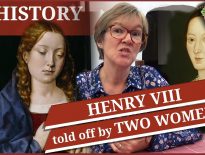On this day in Tudor history, 29th November 1530, at around 8 o’clock in the morning, Cardinal Thomas Wolsey, Henry VIII’s former Lord Chancellor, died at the Abbey of St Mary de Pratis, Leicester.
Cardinal Wolsey, who was in his fifties, cheated the executioner by dying a natural death while on his way to London to answer charges of treason. He surely would have been tried and executed had he reached the capital.
Find out about Cardinal Wolsey's death, and who ended up being buried in the sarcophagus he'd had commissioned, in today's talk.
You can find out more about his downfall and arrest in this video from 4th November:
Also on this day in history:
- 1528 – Birth of Anthony Browne, 1st Viscount Montagu, nobleman and courtier. Montagu was the eldest son of Sir Anthony Browne of Cowdray Park, Sussex, and his first wife, Alice, daughter of Sir John Gage. Montagu's offices in Mary I's reign included Master of the Horse to Philip of Spain, Lord Lieutenant of Sussex and Privy Councillor.
- 1593 – Execution of Richard Hesketh, merchant, at St Albans for treason. Hesketh had incited Ferdinando Stanley, the new 5th Earl of Derby, to lead a rebellion to claim the throne by right of his descent from Mary Tudor, sister of Henry VIII.
Transcript:
On this day in Tudor history, 29th November 1530, at around 8 o’clock in the morning, Cardinal Thomas Wolsey, Henry VIII’s former Lord Chancellor, died at the Abbey of St Mary de Pratis, Leicester. He was in his late 50s.
Wolsey had been arrested at his home, Cawood Castle, on 4th November 1530, and taken into custody by the Earl of Northumberland and William Walsh. He bade farewell to his household on 6th November as he, Northumberland and Walsh set off for London, where he was due to answer charges of treason. They travelled from Cawood to Pontefract and Doncaster, and then to Sheffield Park, home of the Earl of Shrewsbury, arriving there on the 8th. By this time, Wolsey had been taken ill with dysentery and so the group stayed at Sheffield until 24th November. In the meantime, Sir William Kingston, Constable of the Tower of London, had been dispatched from London to escort Wolsey to the Tower and he arrived at Sheffield on 22nd.
When the cardinal had recovered enough from his illness, the group travelled on to Hardwick Hall and then Nottingham. By 26th November, Wolsey’s health had taken a turn for the worse and when they arrived at Leicester Abbey, Wolsey allegedly told the abbot, “Father abbott, I am come hither to leave my bones among you.” He spoke the truth. On the morning of the 29th November 1530, after making his last confession, Wolsey said his famous words:
“I see the matter against me, how it is framed, But if I had served god as diligently as I have done the king, he would not have given me over in my grey hairs.”
In his last hours, Wolsey was worried about the heresies he felt were taking root in England, so before he died he asked Sir William Kingston to advise the King to act against them. He then lapsed into unconsciousness and the abbot performed the last rites. He died at around 8am. His body was laid out in his pontifical robes for people to see before he was buried at the abbey, where he still rests today.
Historian J.J. Scarisbrick writes of how Wolsey “cheated his master of the final reckoning” by dying naturally before he could be tried for treason, and presumably found guilty and executed.
And Sidney Dark, in his 1935 book on Wolsey, writes: “The London crowd was robbed of the sight of his death upon the open block, but there were no doubt great rejoicings on the night that the news of his death reached the capital. Only among the Yorkshire villages had Wolsey set a new light burning in the evening of his life, a light that was remembered long after he had gone from among them, in the form of happier and more prosperous homes; and it may not count for nothing in the final scale of things that a few tears were shed for him, when the news of his death came to London, by a poor fool in the King’s service who mourned the death of a kind master.”
It was a sad end to someone who had served his king faithfully for many years, but at least Wolsey had died peacefully in bed, rather than on the scaffold. His burial in Leicester meant that he was denied the black marble sarcophagus he had commissioned. Henry VIII planned to use the sarcophagus himself, but this never happened and it now houses the remains of Admiral Horatio Lord Nelson, who was laid to rest in it in St Paul’s Cathedral after his death in the Battle of Trafalgar in 1805.
By the way, it really is a myth that Wolsey committed suicide, as depicted in Showtime’s series “The Tudors”, and there is nothing to suggest that he was poisoned either.




I feel really sorry for Cardinal Thomas Wolsey because he was the right hand man of the King. I really don’t think most people realise just how powerful and important he was. It’s like if Henry isn’t there, or often if he was, who is in charge? See the Cardinal Archbishop of York, the Chancellor of England and the number one. He was in charge of the Government and most Church stuff as well.
Wolsey might have had his moments but he was almost entirely relied upon by the young Henry Viii and he was his chief minister. He was doing everything Henry wanted and more. If you wanted a mess sorting out he was the man to sort it for you. The annulment seemed to be no problem at first either until Rome was sacked and even then Wolsey came up with several ways forward, including hearing the case in Court in England. Wolsey didn’t need Campeggio to assist him. He held papal authority in England and could have heard the case himself but the Pope insisted and Henry accepted because it appeared the right thing to do. Henry was still taking advice in 1528. It was with Katherine’s objections that everything changed and Wolsey was under real pressure to get things done. Once the trial at Blackfriars opened Henry was so determined to have his way because by now he was really going to marry Anne Boleyn as soon as possible, Wolsey was in a no win situation because the case moved to Rome. It was adjourned and never resat in England. Katherine was triumphant and Anne really annoyed. Henry was in the middle. He was very upset and angry and saw this as the Cardinal’s failure.
As with a lot of people at Court, Thomas Wolsey knew he had enemies and while Henry favoured him he was safe from them but now he wasn’t. Henry to his credit, did mitigate the punishment the Cardinal could have received when “evidence” of what we might call fraud and corruption was presented and Wolsey pleaded guilty to. There is no doubt he was guilty as well. However, he may not have been guilty of everything. He was heavily fined, lost his public office and banished from Court but then he was given a pension and allowed to retire. Henry even received him one last time. However, his enemies were never satisfied and treason charges followed. The Archbishop was now very ill and his illness killed him on the way to London. I question as to whether Henry would have signed his death warrant or intervened again as he wasn’t quite as capricious yet as he was to become. However, a faithful man who deserved much better from a King who now just wanted one thing, to end his marriage to Katherine of Aragon, deserved better. I have been to the ruins which are in a public park now in Leicester and there is a stone marking where Wolsey was buried. It isn’t known if it’s the exact spot but it is believed he is somewhere close by. What was capricious is how later on Henry took his original tomb plan and materials for himself, made them grandeur, made himself the original sarcophagus and intended this grand monument at Windsor. It may actually be appropriate that the Reformation meant Henry had his outlandish tomb and canopy removed and only has a black marble, albeit a fine one over his vault at Windsor and Lord Nelson has the sarcophagus in Saint Paul’s Cathedral. Henry Viii was the father of the English navy and a great naval hero lies in his tomb.
Thomas Wolsey, however, did his best for many years and Henry should have appreciated him better. He should not have been so open to his destruction.